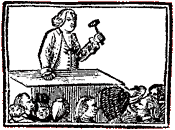“Evidence that his country was once as ours is”
The first was a copy of Henry Pelham’s engraving of the Boston Massacre, shown here. The second was a copy of Green and Russell’s Boston Post-Boy for 27 June 1768, with news of John Wilkes’s election in London, the Circular Letter, and the Virginia House of Burgesses’ response to it.
But it’s clear from the space the correspondent devoted that the real interest lay in that newspaper’s advertisements about escaped slaves and slave sales. The magazine quoted three ads in full, concluding with this one, which ran in the other Boston newspapers as well:
On Thursday next, 30th Inst, at Three O’clock Afternoon, Will be sold by Public Vendue, at the Auction Room in Queen Street, A Variety of GOODS, among which are, Irish Linnens, Calicoes, Lutestrings, black Sattins, black corded Silk, stripe Hollands, Kenting Handkerchiefs, Scotch Threads, Dowlass, Duroys, Druggets, Breeches Patterns, Men’s and Women’s fine Cotton Hose, Felt Hats, Men’s and Women’s Saddles, Portmanteaus, Housings and Holsters, Cases with 15 Bottles, a Cask of very good Indigo; also a Negro Girl, 13 years old.“J.A.” then commented:
J. Russel, Auctioneer.
At Private SALE, Two Pipes of Sterling Madeira, a Negro Man 40 years of age, a Boy of 14, and two Girls about 12 Years of Age, a second-hand Chaise and Harness, and sundry riding Habits, trimm’d with Gold and Silver Lace.
Men, boys, and girls, classed among ‘GOODS’s!!–and this, not in New Orleans—not in Charleston—not in Richmond: but in Boston!I believe today we’d call that article “trolling.”
‘But,’ some “philanthropist” may say, on seeing this evidence that his country was once as ours is, ‘we have put away that evil from us. We declared a general emancipation in 1780.’
And how many of that species of GOODS did Massachusetts have, at that time? Why, not quite five thousand. Virginia has little, if any fewer than five HUNDRED thousand: just an hundred for one! How could she follow the example of her northern sister? Other considerations, make the contrast, and the impossibility, yet more striking: the difference of climate; and the inmensely greater disproportion of the whites to the blacks (in Massachusetts sixty to one; in Virginia not two to one.)
The facts here presented are designed to rebuke only the intermeddlers—not the rational and forbearing part—of the northern people. I am among those who believe the latter sort to be a majority there; not only in numbers, but still more in virtue and intelligence.



